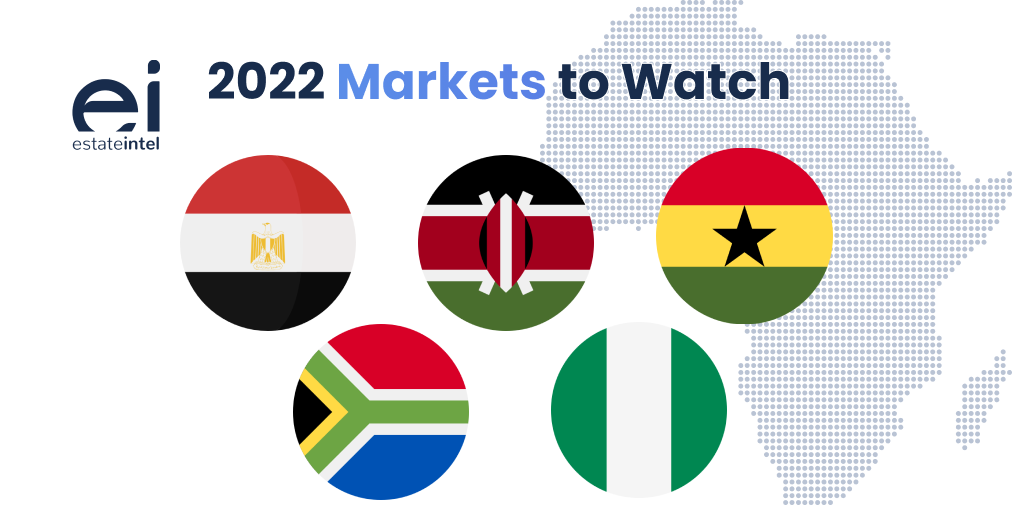Your 2022 real estate markets to watch out for in Africa
Tilda Mwai . 2 years ago

Share this post
Subscribe to our newsletter
From increased foreign direct investment, shifting occupier patterns to ecommerce, 2022 is expected to be a record year for the real estate market in Africa. However, a divergence continues to exist in market performance across key markets in the continent. Below we identify the factors likely to impact performance in Africa’s top markets and the…
From increased foreign direct investment, shifting occupier patterns to ecommerce, 2022 is expected to be a record year for the real estate market in Africa. However, a divergence continues to exist in market performance across key markets in the continent. Below we identify the factors likely to impact performance in Africa’s top markets and the key sectors to watch out for in these markets.
Real Estate Boom in Egypt set to continue
The Egyptian real estate market has generally emerged as a winner from the pandemic. The sector grew by 8% in 2021 according to the Ministry of Planning, with developers noting that the local real estate sector remains stable for the first time in 15 years. Overall, the market attracted approximately US$10 billion in sales in 2021 with further foreign investments of US$ 500million underpinning the growing investor confidence in the market.
This stability across the property cycle makes the general real estate market across all sectors one to watch out for in 2022, especially for core capital allocation. The residential sector in specific is set to be a stand out performer underpinned by increased foreign investments as well as a decline in interest rates allowing for increased investments. As a result, the sector is set to record steady demand as well as increased supply in the number of completed units as highlighted by the Egyptian Businessmen Association.
Growth expected in Nairobi’s real estate market despite economic and political uncertainty.
Kenya’s real estate sector grew by 5.2% in the third quarter of 2021. This represented an increase in comparison to the 3.7% increase recorded in the corresponding quarter in 2020 (Kenya National Bureau of Statistics). Over the same period, the number of land transactions more than doubled from the 1,734 transactions recorded in 2020 according to the Ministry of Lands and Physical Planning, underscoring the return to market activity in the real estate market. Whilst this increased activity is set to continue throughout 2022,currency fluctuations and political uncertainty against the backdrop of the upcoming general election are set to weigh on the momentum gained by the sector with overall GDP growth projected to slow to 5.9% in 2022 from 8% in 2021 according to the Central Bank of Kenya.
That said, the prime office market will remain a key sector to watch out for in the market with Nairobi’s position as a regional hub being buoyed by the inauguration of the Global Trade Center tower as well as the establishment of the Nairobi International Financial Centre. Combined with pent up demand for prime offices, vacancy levels are set to remain low with major office parks such as the Garden City Business Park recording occupancy levels above 90%.
Emerging hotspots to steer growth in Nigeria’s real estate market
The Nigeria real estate market remained relatively resilient in the year to December 2021 in a return to market activity. However, key sectors such as the office and hospitality sector remained subdued with offices recording vacancy levels of up to 36% for Grade B offices and the hospitality sector recording low occupancy levels of 55%.
That said, we anticipate the market will continue growing with sectors such as residential, logistics and healthcare, fueling this growth. Increased demand coupled with limited supply in the residential sector in particular, are set to underpin the sector’s performance in 2022. What’s more, increased infrastructure developments are set to result in key emerging hotspots in areas such as Epe and Yaba that are expected to outpace the overall residential market. These areas recorded a surge in demand over the past year and have seen their overall rental yields track the average market rate of 5% at 4.3% and 5% respectively.
Investors demand to fuel Ghana’s real estate market
According to the Ghana Investment Promotion Center, the country attracted $2.65bn in foreign direct investment (FDI) inflows in 2020, the highest amount in West Africa. This growth continued in 2021 with the country recording over $800mn in FDI during the first half of the year. The real estate sector in particular remains among the most attractive sectors due to its strong income profile with annual yields averaging 10% across the retail, office and industrial properties.
This trend is set to continue in 2022 against the backdrop of Ghana’s ‘Year of the return’ campaign aimed at encouraging investments from Africans living in the diaspora. Headwinds in the form of rising debt burden and the subsequent degradation in the Fitch ratings to a negative outlook are yet to temper buyer confidence with demand across all sectors expected to continue growing. The residential sector in particular will be a key sector to watch out for, fueled by strong market fundamentals such as demographics and key government interventions aimed at reducing interest rates.
Business confidence build back to boost logistics demand in South Africa
The resurgence in Covid-19 caseloads and their resultant impact on the business environment has crumpled South Africa’s growth forecasts to 1.9% in 2022 from 4.6% in 2021 according to the IMF. However, business confidence remains resilient underpinned by major fiscal and monetary regulatory initiatives undertaken by the government. The South African Chamber of Commerce and Industry Business Confidence Index (SACCI BCI) averaged 94.0 for the first eleven months of 2021 and was 8.2 index points higher than the 85.8 average for the corresponding period in 2020 underscoring this positive outlook.
This optimism is set to trickle down to the real estate market with the market expected to remain resilient in 2022. The logistics sector in particular will be a key market to watch out for, fueled by the growing ecommerce market and steady demand for prime logistics facilities. According to Rode’s industrial survey, the sector recorded a 3.7% y-o-y increase in nominal rent in Q4 2021 amidst low vacancy levels, ending the year as the top performing property market.
We love your feedback. Let us know your thoughts about the real estate market in Africa by sending us an email at [email protected].
Related News
You will find these interesting

Bisi Adedun . April 15, 2024
asaba mall
Delta Mall

Bisi Adedun . April 05, 2024
andmark tower
Lagos-Calabar highway

Bisi Adedun . March 19, 2024
Airtel Business under its Nxtra arm recently conducted the groundbreaking for their new data centre facility in Lagos, N...
airtel nxtra
Data Centres